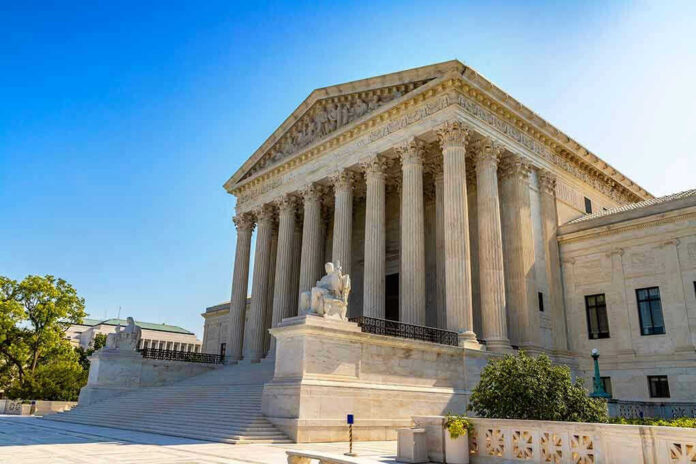
Supreme Court justices from both sides of the bench expressed serious skepticism about President Trump’s aggressive tariff program, raising constitutional concerns that could derail a cornerstone policy designed to protect American workers and restore economic sovereignty.
Story Overview
- Conservative and liberal Supreme Court justices questioned Trump’s legal authority to impose tariffs under emergency powers.
- Lower courts ruled Trump lacked authority under IEEPA to impose reciprocal and fentanyl tariffs without congressional approval.
- Tariffs range from 10% baseline to 50% on some nations, generating $151 billion in increased revenue.
- Constitutional separation of powers is at stake as justices weigh executive overreach against legislative taxing authority.
Constitutional Authority Under Fire
Supreme Court justices on Wednesday challenged the Trump administration’s use of the International Emergency Economic Powers Act to impose sweeping tariffs without congressional authorization.
Solicitor General D. John Sauer defended the policy as “regulatory tariffs” rather than revenue-raising measures, arguing they fall under executive foreign commerce powers.
However, both conservative and liberal justices questioned this distinction, with Justice Sonia Sotomayor bluntly stating that tariffs are taxes that “generate money from American citizens.” Lower federal courts have already ruled that Trump lacked the legal authority he cited for these measures.
During oral arguments, Supreme Court justices were skeptical that the President's sweeping tariffs were lawful, questioning whether he exceeded his authority under the International Emergency Economic Powers Act and encroached on Congress’s power to tax: https://t.co/YCEC0uHOIn
— SWACCA (@swaccainfo) November 5, 2025
Separation of Powers Concerns Emerge
Justice Neil Gorsuch raised alarming questions about executive power accumulation, asking what prevents presidents from vetoing congressional attempts to reclaim tariff authority. “It’s a one-way ratchet toward the gradual but continual accretion of power in the executive branch and away from the people’s elected representatives,” Gorsuch warned.
This concern reflects conservative principles about constitutional limits and congressional authority over taxation. Chief Justice Roberts and other conservative justices also pressed the administration’s attorney, suggesting broad skepticism about bypassing Congress on matters traditionally requiring legislative approval.
Economic Impact and Strategic Purpose
The tariffs start at 10% on many nations and reach 50% on goods from India and Brazil, generating substantial revenue increases of nearly 300% compared to fiscal year 2024. The Committee for a Responsible Federal Budget projects $3 trillion in additional revenue by 2035 if the tariffs stand.
Trump has consistently argued these measures protect American workers and encourage domestic manufacturing, posting on Truth Social that the case is “literally, LIFE OR DEATH for our Country.” The policy aims to counter decades of foreign trade advantages and strengthen national security through economic independence.
Constitutional Stakes and Uncertain Outcome
The case represents a critical test of presidential power versus constitutional constraints, with Treasury Secretary Scott Bessent warning the government might face $750 billion in refunds if the Court rules against the tariffs.
Critics argue the measures burden American businesses and consumers rather than foreign competitors, as illustrated by plaintiff Victor Schwartz, whose wine importing business faces significant challenges.
However, supporters view the tariffs as essential tools for restoring American economic strength and negotiating fair trade deals. The Court will issue its decision at an undetermined future date, leaving this constitutional question unresolved.















